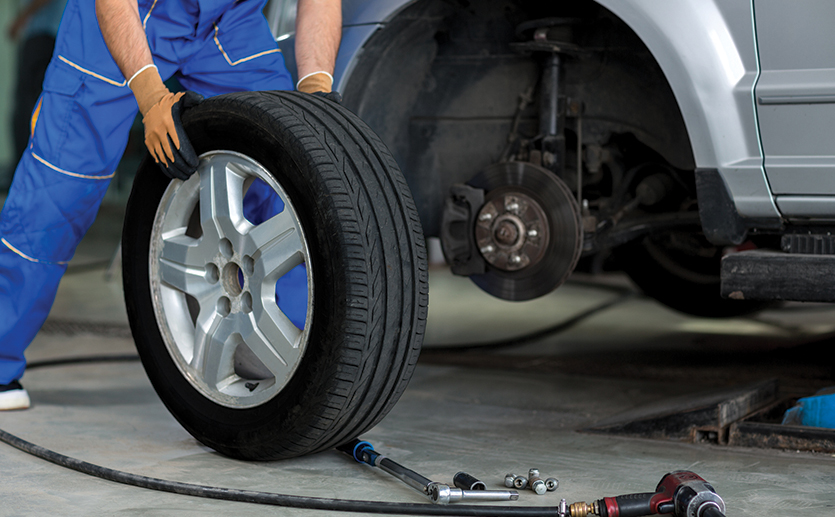Tire Shop Near Me: Top-Rated Morris IL Locations
Tire Shop Near Me: Top-Rated Morris IL Locations
Blog Article
The Web Link Between Tire Solution and Gas Efficiency
Among the numerous elements that influence gas efficiency, tire service stands out as a critical component that commonly goes ignored. The intricate connection in between tire maintenance and fuel economic situation is a testament to the intricate operations of an automobile.
Importance of Appropriate Tire Inflation
Appropriate tire rising cost of living is a crucial consider making best use of fuel effectiveness and making sure optimum vehicle efficiency. When tires are underinflated, it creates more rolling resistance, triggering the engine to work more challenging and shed even more fuel to keep the exact same speed. On the other hand, overinflated tires can result in a harsher experience, irregular tire wear, and reduced traction. To find the advised tire stress for your car, describe the proprietor's guidebook or the sticker label situated on the chauffeur's side door jamb.
Keeping the right tire pressure not only improves fuel efficiency yet additionally boosts driving safety. Frequently examining and adjusting tire pressure, especially in the past long trips, is a simple yet efficient way to optimize your vehicle's fuel economy and make sure a smooth driving experience.
Influence of Tire Footstep Deepness
Maintaining the advised tire pressure is vital for ideal car efficiency and fuel performance; similarly, the tread deepness of your tires plays a critical duty in making sure safety and grip on the road. Tire step depth straight impacts the capability of your tires to grasp the road surface area, especially in damp or slippery problems. As tires put on down, their tread deepness reductions, affecting their capacity to network water away and preserve appropriate contact with the road. The advised minimum walk depth is typically 2/32 of an inch, however, for enhanced security and efficiency, several experts recommend changing tires before they reach this point. Appropriate tread deepness not only makes sure far better handling and stopping however likewise adds to fuel effectiveness by minimizing moving resistance. On a regular basis evaluating your tire walk deepness and changing tires when needed is an easy yet efficient means to promote both safety and fuel effectiveness when driving.
Role of Wheel Alignment in Efficiency
Ensuring precise wheel placement is essential for enhancing lorry efficiency and making the most of fuel economy. Appropriate wheel alignment entails changing the angles of the wheels to manufacturer specifications, guaranteeing that they are identical to each other and vertical to the ground. When this content wheels are misaligned, it can bring about irregular tire wear, raised moving resistance, and lowered gas effectiveness.

Additionally, precise wheel alignment can likewise improve managing and stability, lowering the quantity of power needed to steer the automobile (morris tire service). By reducing unneeded friction and drag, appropriate wheel placement plays an important role in boosting overall car performance and gas economic climate. Regular wheel positioning checks and adjustments are crucial for preserving optimum efficiency and maximizing fuel financial savings
Link In Between Tire Maintenance and MPG
A vital element of optimizing fuel effectiveness in automobiles is the upkeep of tires and their direct influence on miles per gallon (MPG) Appropriate tire upkeep plays a vital duty in taking full advantage of Discover More Here fuel economic situation. One vital aspect affecting MPG is tire stress. Underinflated tires boost rolling resistance, triggering the engine to function harder and melt more fuel. On the other hand, overinflated tires decrease the contact patch with the road, resulting in irregular wear and reduced gas effectiveness. Regularly checking and maintaining the appropriate tire stress can considerably improve MPG.
In addition, tire tread deepness also affects fuel performance. Worn-out treads minimize grip, especially in damp conditions, requiring the engine to put in even more power to maintain speed. This boosted resistance results in greater fuel consumption. By making sure tires have ample tread depth, motorists can boost both safety and security and gas economic climate.
Essentially, proper tire upkeep, including tracking tire stress and walk depth, is directly connected to accomplishing optimum MPG. By integrating normal tire assessments and maintenance right into a car care regimen, chauffeurs can not just expand tire life however also enhance fuel performance, ultimately conserving money and reducing environmental effect.

Tips for Fuel-Efficient Tire Treatment
Given the crucial relationship between tire upkeep and fuel performance, implementing effective strategies for enhancing tire treatment is essential to additional info boosting overall vehicle efficiency. To ensure fuel-efficient tire treatment, routine tire pressure checks are crucial. Effectively inflated tires reduce rolling resistance, improving gas efficiency and extending tire lifespan. Furthermore, keeping correct wheel positioning and balancing helps disperse weight equally, preventing uneven tire wear and maximizing fuel usage. Revolving tires at recommended intervals advertises also step wear, enhancing fuel efficiency by making sure all tires contribute equally to car performance. It is also critical to evaluate tires for signs of damages, such as cuts, slits, or protrudes, as these problems can impact fuel efficiency and general safety and security. Selecting tires with reduced moving resistance can significantly boost gas economic situation. By incorporating these fuel-efficient tire care tips into a routine maintenance schedule, vehicle drivers can optimize fuel performance, minimize running prices, and prolong the life of their tires.
Conclusion
By routinely keeping tires and adhering to fuel-efficient tire care tips, drivers can enhance their automobile's efficiency and decrease fuel consumption. It is essential to prioritize tire upkeep to not only conserve cash on gas prices however likewise to promote general vehicle effectiveness.
Report this page